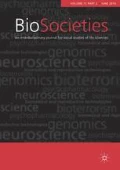Abstract
The question of informed consent has been central to public and scholarly debates on research biobanking, as well as to regulatory efforts. We discuss why this concept has gained such a central position and argue that it has less to do with its adequacy as a regulatory tool than with its capacity as a deflecting concept, shifting the focus away from more serious, but at the same time less governable issues. While its main value for medical science lies in its function as a signifier of ‘normal’ and responsible scientific conduct, in politics it functions as an ‘emergency exit’, a way to remove fundamental problems from the public and political field without having to solve the unsolvable. The individualizing gaze of informed consent overshadows questions of a predominantly collective nature, such as possible broader socio-cultural changes brought about by biobank-based research. However, the notion of genetic solidarity or altruism, which has been offered as an alternative framework to informed consent, does not open up the space for political and public debate on the objectives and consequences of research biobanks, but rather puts a further lid on such debate, through defining medical research as an unconditional good in its own right.
Similar content being viewed by others
Author information
Authors and Affiliations
Corresponding author
Additional information
aOle Andreas Brekke is a post-doctoral Research Fellow at the Stein Rokkan Centre for Interdisciplinary Social Studies in Bergen, Norway. He completed his doctoral degree in Political Science in 2005, with a thesis discussing the history and development of technology assessment as an intermediary between science, politics and the public. His studies have centred on the political and social construction of meaning of human biotechnology. His current research projects concern the status of informed consent in relation to population biobanks, and religious discourse in the science and politics of human biotechnology.
bThorvald Sirnes is the Research Director at the Stein Rokkan Centre for Interdisciplinary Social Studies, University of Bergen. In his 1997 doctoral thesis he compares the political understanding and codifications of human biotechnology in UK and Norway. He is working on projects on biobanks and informed consent, comparative stem cell politics, pre-natal diagnostics and selective abortion, and abortion metaphors. He is also engaged in a project on the politics of morality and the power of the moral dimension. Sirnes has previously been a member of the Norwegian Biotechnology Board.
Rights and permissions
About this article
Cite this article
Andreas Brekke, O., Sirnes, T. Population Biobanks: The Ethical Gravity of Informed Consent. BioSocieties 1, 385–398 (2006). https://doi.org/10.1017/S1745855206004029
Published:
Issue Date:
DOI: https://doi.org/10.1017/S1745855206004029




